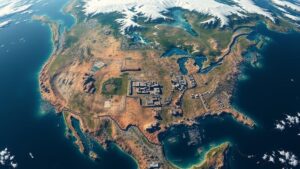How professional explorers handle the geopolitics of discovering artifacts in disputed territories.
How Professional Explorers Handle the Geopolitics of Discovering Artifacts in Disputed Territories
Discovering artifacts in disputed territories presents a complex web of geopolitical challenges. Professional explorers often find themselves navigating the intricate intersection of archaeology, validity of claims, and the potential implications of their findings. This article explores how these explorers address the various political, ethical, and legal ramifications associated with their work in these sensitive areas.
The Global Landscape of Disputed Territories
Disputed territories often carry a rich historical narrative, yet they are riddled with tensions stemming from conflicting national claims. For example, the South China Sea is a hotspot where several nations assert sovereignty over tiny islands and waters rich in natural resources. As of 2023, numerous archaeological sites have been identified in this region that holds significant cultural and historical importance for multiple countries, creating a volatile environment for explorers.
Understanding International Law
While explorers are driven by the quest for knowledge, they must operate within the framework of international law. The United Nations Educational, Scientific and Cultural Organization (UNESCO) has established guidelines that govern the excavation of artifacts, particularly in areas with competing territorial claims. e laws highlight the importance of consent from involved nations.
For example, the case of the Elgin Marbles illustrates how disputed artifacts can lead to international contention. These artifacts, originally from the Parthenon in Greece, are housed in the British Museum, leading to Greeces ongoing efforts for their return since the early 1800s. Explorers must be aware that their findings could trigger similar disputes, necessitating careful consideration of legal ownership.
Collaborative Approaches
To mitigate geopolitical tensions, many professional explorers adopt collaborative approaches. By partnering with local institutions and governments, explorers can facilitate a smoother process of discovery and research. For example, archaeologists working in the Yezidi regions of Iraq have engaged local communities to ensure cultural sensitivity and compliance with national laws. This collaboration not only fosters goodwill but also promotes the preservation of cultural heritage.
- Engage with local experts to enhance understanding and respect for cultural context.
- Negotiate agreements that outline data sharing and artifact management.
Risk Assessment and Political Sensitivity
Professional explorers must conduct thorough risk assessments before embarking on expeditions. Understanding the political climate, potential for conflict, and historical grievances is essential. For example, expeditions in the highlands of Tibet require acute awareness of the region’s political sensitivity, given its tumultuous history with China. Failure to recognize these nuances can place both the explorer and their team in jeopardy.
In many cases, explorers will conduct preliminary research to gauge local sentiment and potential reactions. Historical events, such as the recovery of artifacts from the Giza Plateau in Egypt, demonstrate that unilateral actions without local cooperation can incite backlash, leading to temporary bans on excavation activities.
Ethical Considerations in Artifact Recovery
Ethics play a critical role in artifact recovery, particularly in disputed regions. Explorers face the dilemma of balancing the pursuit of knowledge with the moral implications of their endeavors. For example, the controversy surrounding the removal of artifacts from indigenous lands in North America has led to a growing emphasis on repatriation and the rights of indigenous communities to retain their cultural heritage.
- Prioritize the wishes and rights of local populations regarding their cultural heritage.
- Advocate for repatriation policies when appropriate to honor historical ties.
Real-World Applications of Geopolitical Navigation
In practice, successful explorers often cite examples from their experiences as learning opportunities. activities of Archaeologists in Syria during the civil war exemplify a commitment to preserving history even amid chaos. By documenting sites remotely and using innovative technologies such as 3D imaging, they have paved the way for future studies while minimizing risks associated with on-site research in conflict zones.
Conclusion and Actionable Takeaways
Navigating the geopolitics of artifact discovery requires explorers to be informed, adaptable, and ethically sound. Key takeaways for professionals in this field include:
- Stay abreast of international laws and local regulations before undertaking expeditions.
- Foster collaborative relationships with local institutions and communities to promote cultural sensitivity.
- Conduct thorough risk assessments to ensure the safety of all parties involved.
- Embrace ethical practices that honor the history and rights of indigenous populations.
In a world increasingly defined by political tensions and cultural sensitivities, professional explorers have a unique responsibility to approach their work with the utmost care. By adopting a politically informed, ethical, and collaborative mindset, they can contribute to the preservation and understanding of our shared heritage.



